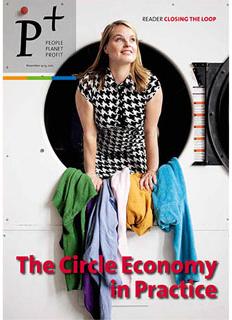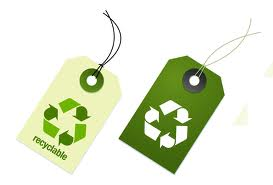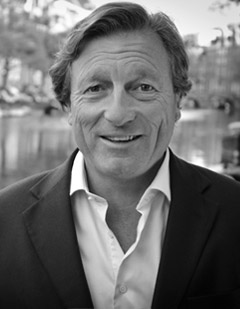'Circular Economy': an introduction |

|
'Circular economy' implies an economy in loops, with an impact
in the realm of job creation, economic
competitiveness, resource savings and waste
prevention. Key elements are:
In the framework of a 'circular economy', emphasis is being laid on selling services instead of goods. In broader terms, the circular approach is a conceptual framework that takes insights from living systems, along the lines of four founding principles:
|
|
Diverse systems, with many connections and scales are more resilient in the face of external shocks, than systems built simply for efficiency. System thinking implies the ability to understand how things influence one another. |
Visions on 'Circular Economy' |

|
In fact, visions on the concept of 'circular economy' can be summarised
in four main approaches:
In the framework of a so-called bio based economy, different kinds of biomass are being used as a substitute for fossil-fuel based resources, like oil, coal and gas. |
|
Examples of biomass relevant in this context:
Biomimicry implies studying natures best ideas with a view to imitating them - by example a leaf as a model for a better solar cell. Industrial Ecology consists of the study of material and energy flows through industrial systems. Two personalities who have been contributing a major part to the concept of cradle-to-cradle ever since 2002, are:
A cradle-to-cradle design is an example of an eco-effective business practice that optimizes human health, recyclable and compostable materials, product life, use of renewable energy, water efficiency and quality while keeping the manufacturers socially responsible. The eco-effective, cradle-to-cradle philosophy responds to the eco-efficiency approach, which only seeks to minimize the negative environmental impacts of a business or industry. The blue economy approach aims at creating jobs, building up social capital and rising income while saving the environment. An international community of companies, innovators and scientists support the concept, providing open source access to develop, implement and share prosperous business models, which target to improve natural ecosystems and quality of life. For this page, articles on Cradle to Cradle, as well as on Blue Economy have been used from the following resources:
|
Speech Robert Jan van Ogtrop 14-11-12 (I) |

|
Speech of Robert Jan van Ogtrop, founder of the organisation Circle
Economy, as noted by Maarten Rigter at the
Closing the
loop conference, 14 en 15 november 2012. We are now in a great system crises, this means change is needed, new ideas are needed. It does not feel good how we are dealing with the planet. The personal transformation of Robert Jan van Ogtrop. Typical man of the macho world, followed an MBA, went into the tunnel of most ambitious business man, wanted to become CEO. Became CEO of Bols Royal Distilleries and subsequently CEO of Remy Cointreau, also was an industrial partner at CVC Capital Partners. Worked at Bols – Wessanen. He saw in the business community, how bad people treat each other. After a management buyout he took a sabbatical and did meditation. During, this time, Rober Jan had more time to think about things which matter, things he wanted to do in the rest of his life. |
|
The answer came… nature, nature, nature. Until
that moment nature. He went to Africa, realised this
is the world, met people who dedicated their whole
life to preserve nature was no part of his
dictionary. He developed himself as Chairman of
Africa parks and as a founder of the Foundation
for Natural Leadership. Also busy with the
Wilderness Foundation and the Wilderness
Leadership School in Africa. Big cooperate
executives come there, also on bush trips. Part of
program is being a night watch of the group at
night without watch, so you have to look to the
moon for the time. Another part of his main message during the conference: We are also in an ethical crises, look to Greece, Italy, also in the Netherlands. You have corruption, greed is everywhere. Politicians using fear as a way to get votes. We are coming from the linear economy. The only thing where people think about in the linear economy is grow. People deplete natural resources, do not think about the future, people are suffocating in their own waste. 99% of all material used, is turning into waste within a few days. |
Speech Robert Jan van Ogtrop 14-11-12 (II) |

|
Short term shareholder model blocks sustainability. If a company can plan for 3 or 5 years periods, this will change. Success is only measured in natural wealth, having ‘a Jaguar’ is everything. We are now already in the red zone. |
|
The situation becomes more critical because the
Chinese and Indians are starting to consume like the West.
Many people have no fun in this life.
We measure everything in GDP growth. In some countries there is another method, people live much more happier there. The circular economy means, every product made has to be food for other products in the next cycle. Nature in it selves is a perfect cycle. People lose track with nature, think they can control nature. That is a mistake, we are part of nature. Nature will always find a new balance, after flooding’s you get droughts etc. People came only on the earth as last part, earth existed already so long. A study of McKinskey about the linear world, came with the stunning result that in the old economy between USD 340 and USD 630 can be saved by material savings. But nobody can do this alone. With the Circular Economy platform and the 5 circles, we try to transform and bring people together. The 5 circles are:
The Circular Economy Platform is non-profit and open for everyone. Part of the concept is hiring: for example we hire Philips to provide lightning in a building, afterwards the lights will last much longer than a few months. The platform is divided in groups: like action circles. In the world there is a great movement and need for change, we have to follow that movement. The ultimate objective of the platform, the world will be circular! |


